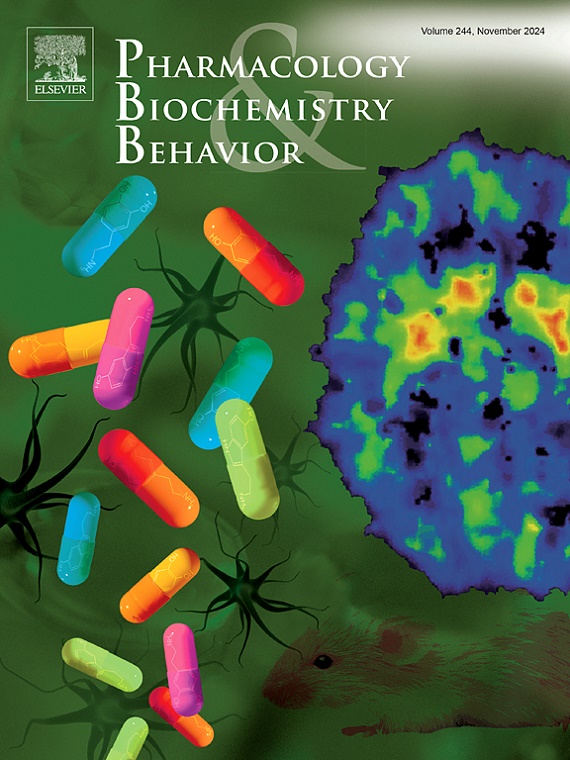Microbiome depletion by broad-spectrum antibiotics does not influence demyelination and remyelination in cuprizone-treated mice
IF 3.3
3区 心理学
Q1 BEHAVIORAL SCIENCES
引用次数: 0
Abstract
Demyelination in the central nervous system (CNS) is a feature of various psychiatric and neurological disorders. Emerging evidence suggests that the gut-brain axis may play a crucial role in CNS demyelination. The cuprizone (CPZ) model, which involves the administration of CPZ-containing food pellets, is commonly used to study the effects of different compounds on CNS demyelination and subsequent remyelination. This study aimed to evaluate the impact of microbiome depletion, induced by an antibiotic cocktail (ABX), on demyelination in CPZ-treated mice and the subsequent remyelination following CPZ withdrawal. Our findings indicate that a chronic 4-week oral ABX regimen, administered both during and after a 6-week CPZ exposure, does not affect demyelination or remyelination in the brains of CPZ-treated mice. Specifically, ABX treatment for 2 weeks before and 2 weeks after CPZ exposure, in the final 4 weeks before sacrifice, and for 4 weeks post-CPZ withdrawal, did not significantly alter these processes compared to control mice receiving water instead of ABX. These results indicate that despite effective microbiome depletion, a 4-week oral ABX regimen does not influence demyelination or remyelination in the CPZ model. Thus, it is unlikely that gut microbiota depletion by ABX plays a significant role in these processes. However, further research is needed to fully understand the role of the host microbiome on CPZ-induced demyelination.
广谱抗生素对铜酮处理小鼠的脱髓鞘和再脱髓鞘没有影响。
中枢神经系统脱髓鞘是各种精神和神经系统疾病的特征。新出现的证据表明,肠脑轴可能在中枢神经系统脱髓鞘中起关键作用。铜酮(CPZ)模型通常用于研究不同化合物对中枢神经系统脱髓鞘和随后的再髓鞘形成的影响,该模型涉及给药含CPZ的食物颗粒。本研究旨在评估抗生素鸡尾酒(ABX)诱导的微生物群枯竭对CPZ治疗小鼠脱髓鞘的影响,以及CPZ停药后的再髓鞘形成。我们的研究结果表明,在CPZ暴露6周期间和之后给予慢性4周口服ABX方案,不会影响CPZ治疗小鼠大脑中的脱髓鞘或再髓鞘形成。具体而言,与接受水而不是ABX的对照小鼠相比,在CPZ暴露前2 周和暴露后2 周、牺牲前最后4 周和CPZ退出后4 周,ABX治疗并没有显著改变这些过程。这些结果表明,尽管有效的微生物组消耗,4周口服ABX方案不会影响CPZ模型中的脱髓鞘或再髓鞘形成。因此,ABX引起的肠道菌群消耗不太可能在这些过程中起重要作用。然而,要充分了解宿主微生物群在cpz诱导的脱髓鞘中的作用,还需要进一步研究。
本文章由计算机程序翻译,如有差异,请以英文原文为准。
求助全文
约1分钟内获得全文
求助全文
来源期刊
CiteScore
6.40
自引率
2.80%
发文量
122
审稿时长
38 days
期刊介绍:
Pharmacology Biochemistry & Behavior publishes original reports in the areas of pharmacology and biochemistry in which the primary emphasis and theoretical context are behavioral. Contributions may involve clinical, preclinical, or basic research. Purely biochemical or toxicology studies will not be published. Papers describing the behavioral effects of novel drugs in models of psychiatric, neurological and cognitive disorders, and central pain must include a positive control unless the paper is on a disease where such a drug is not available yet. Papers focusing on physiological processes (e.g., peripheral pain mechanisms, body temperature regulation, seizure activity) are not accepted as we would like to retain the focus of Pharmacology Biochemistry & Behavior on behavior and its interaction with the biochemistry and neurochemistry of the central nervous system. Papers describing the effects of plant materials are generally not considered, unless the active ingredients are studied, the extraction method is well described, the doses tested are known, and clear and definite experimental evidence on the mechanism of action of the active ingredients is provided.

 求助内容:
求助内容: 应助结果提醒方式:
应助结果提醒方式:


